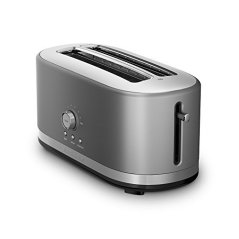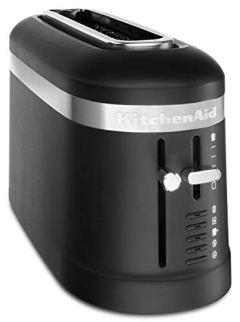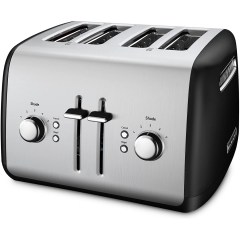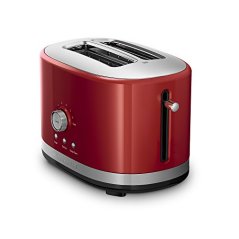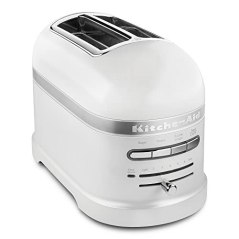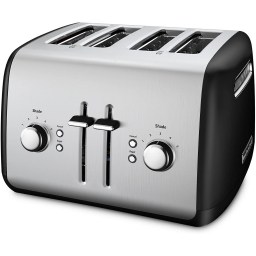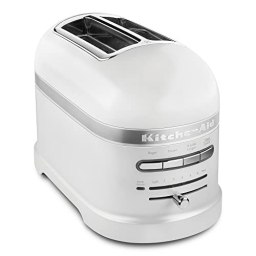Buying guide for Best KitchenAid toasters
When you want a quick, simple breakfast, few things beat a couple of slices of toast with butter, jam, or peanut butter. Having a toaster on your countertop makes toating bread especially easy, and KitchenAid toasters are some of the best on the market.
KitchenAid toasters are all pop-up models, which means they have a spring-loaded tray with slots that you place the bread in. When the bread is fully toasted, the tray pops up so you can grab your toast. If you regularly eat toast or like sandwiches on toasted bread, having a KitchenAid toaster makes enjoying toast whenever you want much easier.
However, your satisfaction comes down to choosing the right KitchenAid toaster for your needs. You have to decide how many slices you need to toast at a time, how big the slots should be, what toast shade settings you prefer, and what other features will make for foolproof toasting. Our comprehensive shopping guide has all the facts you need to choose the best KitchenAid toaster for your countertop. For our top product recommendations, check out the matrix above.
Key considerations
Capacity
Like the majority of pop-up toasters, most KitchenAid toasters feature two slots for toasting two slices of bread at a time. The slots are side by side, which gives the toaster a compact design that won’t take up too much space on your countertop. Two-slice models work best if you only toast occasionally or have a small family.
However, some KitchenAid toasters have four slots for toasting four pieces of bread at a time. These models are obviously a time-saver for large families because you’re able to make multiple servings of toast at once. However, because of the two additional slots, four-slice toasters are larger and take up more space on your counter.
Slot width
If you mainly toast store-bought pre-sliced bread, any KitchenAid toaster will have slots that can accommodate it. However, if you want to toast other types of bread that are thicker, such as homemade varieties and bagels, it’s important to consider the toaster’s slot width.
Some KitchenAid models have slots that are only 1 1/8” wide, while others are 1 1/4” wide. The most generously sized slots are 1 1/2” wide, though it’s important to remember that wider slots typically mean a larger overall toaster.
Manual vs. automatic lift
Most KitchenAid toasters have a manual lift, which means you have to push a button or lever to lower the bread into the toaster and lift it out when it’s finished toasting. However, some models have an automatic lift that senses when the bread is in the slot and automatically lowers it into the toaster. When the bread is finished toasting, the toaster automatically lifts it from the slot, too.
Shade settings
All KitchenAid toasters have shade settings that allow you to select how light or dark you’d like your toast to be. However, some models offer more settings than others, which may be an important feature if you want more control over how dark your toast is.
Every KitchenAid toaster has at least five shade settings, but some have up to seven. The settings are usually numbered, with 1 being the lightest option and 5, 6, or 7 being the darkest.
Features
Toasting functions
All KitchenAid toasters toast effectively, but some offer several toasting functions to take the guesswork out of toasting any bread perfectly. The number and type of toasting functions depend on the model you choose, but some options include:
-
Bagel, which lowers the heat on one side of the toaster to toast the inside without burning the outside of the bagel.
-
Frozen, which allows you to toast items directly from the freezer by defrosting the bread and then toasting it.
-
Keep warm, which keeps your toast at a warm temperature if you’re not ready to eat it right away.
- Reheat, which allows you to warm up toast that has cooled without burning it.
Adjustable slots
While KitchenAid toasters all have a maximum width for their slots, some models have adjustable slots. This allows you to adjust the width so that even smaller pieces of bread fit securely in the slots in a center position, which ensures even toasting.
Crumb tray
When you make toast, crumbs are inevitable. Crumbs that collect inside your toaster can burn, though, and cause the appliance to smoke. To make cleanup as easy as possible, many KitchenAid toasters have a crumb tray at the bottom. It easily slides out so you can throw away any crumbs and clean the tray without trouble.
Cancel/pause
Some KitchenAid toasters feature a cancel and/or pause button to help prevent your toast from burning. A cancel feature immediately stops toasting your bread if you think it might be burning, while a pause feature stops the toasting cycle temporarily so you can check on the bread to see if it’s toasted the way you want. If you want it darker, simply press the bread down again, and the toaster resumes the toasting cycle.
High lift
When your bread is finished toasting, the toaster brings it to the top of the toaster slots. If you’re toasting smaller pieces of bread, though, they might not make it all the way up, which means you have to reach in to pull them out of the toaster. To avoid burned fingers, some KitchenAid toasters have a high lift feature that drives smaller slices of bread up above the top of the slots, so you’re able to pull them out without reaching inside.
KitchenAid toaster prices
KitchenAid toasters vary in price based on their capacity, whether they’re manual or automatic, and the special features they offer. Most models range from $35 to $400.
Inexpensive
The most affordable KitchenAid toasters are manual models with few special features. Two-slice models typically cost between $35 and $55, while four-slice toasters usually range from $55 to $75.
Mid-range
In this range, KitchenAid toasters are manual models that offer some special features, such as a high lift lever and multiple toasting functions. Two-slice models usually cost between $45 and $159, while four-slice models typically range from $65 to $199.
Expensive
The most expensive KitchenAid toasters are automatic models with special features, such as a high lift lever, multiple toasting functions, and extended shade range options. Two-slice models usually range from $210 to $300, while four-slice models typically cost between $310 and $400.
Tips
-
If you use your toaster daily, clean out the crumb tray at least once a week. If you only use it a couple times a week, cleaning it monthly is usually sufficient.
-
To avoid the possibility of getting shocked, never use a metal utensil to lift toast out of your toaster’s slots.
-
When you place a bagel in your toaster, insert it with the cut side facing inward to make sure that the inside gets nicely browned while the outside doesn’t burn.
-
All breads don’t toast at the same rate. Sweet breads and white bread usually need less time to toast, while denser breads require more time.
FAQ
Q. What’s the best way to clean a KitchenAid toaster?
A. Before cleaning your toaster, always make sure that it’s unplugged. Wipe the exterior with a damp rag, and then dry it with a second cloth. Remove the crumb tray from the toaster and empty it. You can use a damp cloth to wipe it down, but be sure to dry it thoroughly before returning it to the toaster.
Q. Can I put frozen waffles and pancakes in my KitchenAid toaster?
A. If your toaster has wide enough slots to accommodate waffles and pancakes, you can use it to heat them for breakfast. However, if you want to cook frozen waffles and pancakes, it’s best to use a KitchenAid toaster with a frozen function that defrosts the food before toasting it.
Q. Do KitchenAid toasters include a warranty?
A. All KitchenAid toasters offer some type of warranty protection. Some models provide a one- or two-year warranty, while others have a five-year total replacement warranty. Be aware that the warranty won’t cover any damage that results from misuse or an accident.


